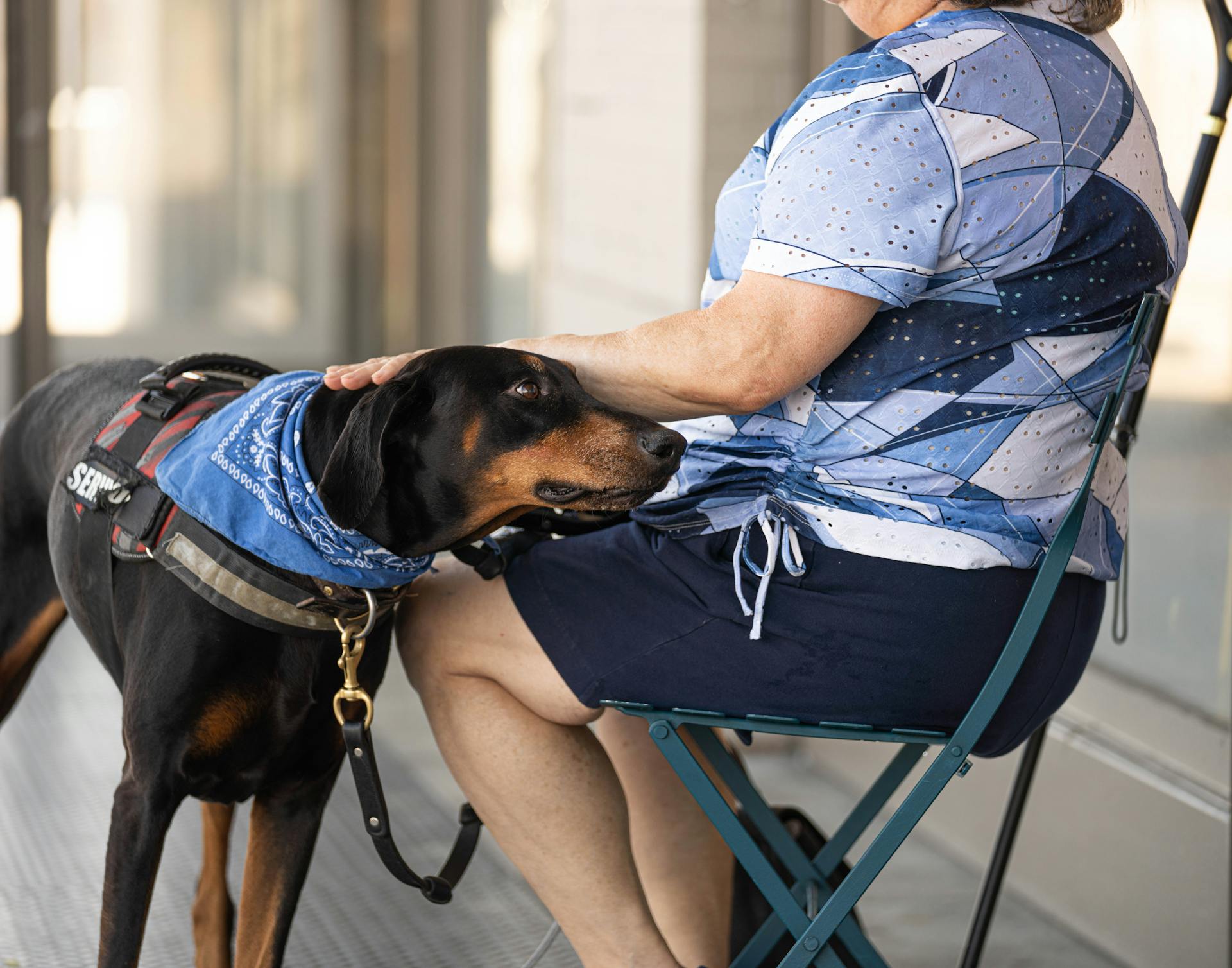
In the US, service dogs are legit, backed by federal law. The Americans with Disabilities Act (ADA) of 1990 requires businesses to allow service dogs in all areas, even if pets are not allowed.
Service dogs are trained to perform specific tasks for individuals with disabilities. These tasks can include guiding the blind, alerting the deaf, or providing support for those with mobility issues.
Under the Fair Housing Act, landlords are required to make reasonable accommodations for service dogs. This means allowing service dogs in rental properties, even if there's a no-pets policy.
The ADA also protects the rights of service dog owners in public transportation. Service dogs and their owners have the right to travel together, without being separated.
Expand your knowledge: Ada and Service Dogs
USA Service Dogs: Legitimacy and Regulations
Service dogs are not required to wear vests or carry identification cards, as it's largely an honor system and businesses are not allowed to ask for proof of certification.
The certification process for service dogs is not recognized by the ADA, and most certification agencies are scams that charge around $100 for a fake ID card.
It's estimated that the number of fraudulent service dogs is hard to know due to the lack of a central database, but one licensing website reported a client list growing from 2,000 to 11,000 members between 2012 and 2013.
Service animals are not exempt from local animal control or public health requirements, and are subject to the same licensing and vaccination rules as all dogs.
Mandatory registration of service animals is not permissible under the ADA, but some communities maintain voluntary registries that serve a public purpose, such as ensuring emergency staff know to look for service animals during an evacuation.
There is no official database or registry of service animals, and businesses are not allowed to ask for a certificate or registration as a condition of being permitted in public places.
Service dog owners are not required to get or carry any kind of service dog certificate, and businesses are not allowed to ask for one.
Check this out: Are Service Animals Only Dogs
Some service animals are trained to perform specific tasks, such as reminding the handler to take medicine or providing safety checks for individuals with PTSD.
The ADA does not require service animals to complete an official training program, but many training programs are expensive and can be a barrier for some people.
Service animals are not required to follow local laws or licensing requirements, but they are subject to the same vaccination rules as all dogs.
Businesses cannot exclude or remove a service animal based on the notion that the animal might threaten the safety of others, or based on bad experiences with other animals.
Explore further: How to Make Dogs Service Animals
Certification and Training
Service animals are not exempt from local animal control or public health requirements, so it's essential to follow local laws.
Service animals are subject to local dog licensing and registration requirements, just like any other dog.
Mandatory registration of service animals is not permissible under the ADA, which means you can't be forced to register your service animal.
A unique perspective: Ada Requirements for Service Dogs
However, some communities offer voluntary registries that can be beneficial, such as a reduced dog license fee.
Colleges and local governments may offer voluntary registries for service animals, and many communities maintain a voluntary registry for emergency purposes.
Service dogs have to go through rigorous training before they're ready to help people with disabilities, which includes remaining calm in public and not interacting with other people while wearing their harness.
Service dogs are selected for intelligence, obedience, and temperament, making them truly amazing animals.
Service Dog Breeds and Types
The ADA doesn't restrict the type of dog breeds that can be service animals. This means that any dog can potentially be a service animal, regardless of its breed.
Municipalities with breed restrictions must make an exception for a service animal of a prohibited breed, unless the dog poses a direct threat to others. This is a crucial point to remember, as it means that even if a breed is banned in your area, a service animal of that breed is still allowed.
Local jurisdictions must determine on a case-by-case basis whether a particular service animal can be excluded based on its actual behavior or history. This means that each situation is unique and must be evaluated individually.
Staff must still offer their goods or services to the person without the animal present if it's excluded. This ensures that individuals with service animals are not unfairly denied access to services.
Breed restrictions differ significantly from jurisdiction to jurisdiction, with some areas having no restrictions at all. This can make things confusing, especially for people who travel frequently.
Americans with Disabilities Act (ADA) and ESAs
The Americans with Disabilities Act (ADA) and ESAs. Let's break it down. The ADA is a law that protects people with disabilities from discrimination and ensures they have equal access to businesses and public places. It specifically protects the rights of people with service dogs to bring them to public places like shops, restaurants, and hotels.
Additional reading: Is a Public Access Test Required for Service Dogs
Service dogs must be individually trained to perform specific tasks to aid a person with a disability. These tasks might include acting as a guide dog or hearing dog for people with visual or hearing impairments, assisting with mobility-related tasks for wheelchair users, or sensing and alerting about oncoming seizures. Service dogs don't need to wear vests or carry identification to prove they're service animals.
Emotional support animals (ESAs) are different from service animals. To qualify as an ESA, you must be prescribed one by a licensed mental health professional. This professional will write you an ESA letter stating that you have been diagnosed with a mental or emotional disability and that your ESA is necessary for your treatment. The letter is the most important part, and the only legitimate way of proving that your animal is an ESA.
There's no requirement for ESAs to wear vests or carry identification, but some people choose to do so. Be aware that online services offering to certify or register ESAs are not recognized by the ADA, so don't waste your money on these services.
Check this out: Mental Health Service Dogs California
Regulations and Penalties
In many states, it's illegal to falsely present a pet as a service animal, with fines, community service, and even jail sentences possible.
The following states have laws prohibiting the fraudulent representation of a service animal: Florida, California, Colorado, Idaho, Kansas, Maine, Michigan, Missouri, Nebraska, Nevada, New Hampshire, New Jersey, New Mexico, New York, North Carolina, Texas, Utah, Virginia, and Washington.
Some states have compiled comprehensive state-by-state information about laws related to service animals, including the fraudulent representation of a service animal.
Intriguing read: Laws regarding Service Dogs in California
Penalty for Misusing Service Dog Vest
In some states, it's a serious offense to misrepresent a pet as a service animal, and the penalties can be steep. Fines, community service, and even jail sentences are possible consequences.
Florida, California, and many other states have laws prohibiting this practice. In fact, there are 19 states where it's explicitly illegal to falsely present a pet as a service animal.
If you're caught misusing a service dog vest, you could face significant penalties. The specific laws vary from state to state, but the consequences can be severe.
Here's a list of states where it's illegal to falsely present a pet as a service animal:
- Florida
- California
- Colorado
- Idaho
- Kansas
- Maine
- Michigan
- Missouri
- Nebraska
- Nevada
- New Hampshire
- New Jersey
- New Mexico
- New York
- North Carolina
- Texas
- Utah
- Virginia
- Washington
It's essential to understand the laws and regulations surrounding service animals to avoid any potential consequences.
Little Regulation and Enforcement

The lack of regulation and enforcement when it comes to service animals is a significant issue.
Most certification agencies for service animals are a ruse, experts say, because by law, service dogs need no identification, papers, letters, or even a vest.
The internet offers a variety of certification agencies that send an ID with a picture of the dog after a short interview, but they are largely a scam.
These agencies often charge around $100 for their fake certifications, and some have seen a significant increase in clients, such as one licensing website that grew from 2,000 to 11,000 members between 2012 and 2013.
It's hard to know the number of fraudulent service dogs, given the lack of a central database.
Many people, including a 90-something mother, have bought service dog vests for their pets or seen nothing wrong with it.
Service animals don't have to follow local laws to license or maintain vaccination requirements, which can make it difficult to track and regulate them.
Additional reading: Certification for Service Dogs in Florida

The ADA does not require that service animals complete an official training program, and many training programs are expensive, which can be a barrier to some people.
It's illegal to claim a pet is a service animal, but the laws vary from state to state, and some states have laws prohibiting this.
Related reading: Service Dogs Washington State
Limit on Animal Ownership
An individual with a disability is not limited to having only one service animal. In fact, it's common for individuals with disabilities to have multiple service animals that perform different tasks.
There are many reasons why individuals may have more than one animal, such as having a mobility disability and a psychiatric service animal.
Service animals and their handlers must follow local laws to license or keep vaccinations up to date.
Exclusion of Animals
In some cases, animals can be excluded from certain areas or activities, such as zoos and wildlife sanctuaries. These institutions often have strict regulations in place to ensure the health and safety of both humans and animals.
The Endangered Species Act prohibits the importation and exportation of certain animal species. This means that it's not possible to bring in or take out certain animals from the country without proper permits and licenses.
Some areas, like national parks, may have restrictions on feeding or approaching wildlife. This is to prevent disturbing the natural behavior of the animals and to maintain a safe distance between humans and wildlife.
Animal cruelty laws vary by state, but they often include penalties for neglecting or mistreating animals. For example, a person may be fined or jailed for leaving an animal without food or water.
Frequently Asked Questions
How can you tell a real service dog from a fake?
Look for a service dog that is calm, focused, and obedient, and is not seeking attention or interacting with strangers. If the dog is exhibiting unusual behavior, it may be a fake service dog
How much does a USA service dog cost?
The cost of a service dog in the USA can range from $15,000 to $50,000 or more, depending on its specific tasks and responsibilities. Understanding the costs involved can help you make an informed decision about bringing a service dog into your life.
Sources
- https://adata.org/service-animal-resource-hub/misconceptions
- https://www.ada.gov/resources/service-animals-faqs/
- https://www.certapet.com/fake-service-dog-registration/
- https://anythingpawsable.com/fake-service-dog-complications/
- https://www.csmonitor.com/USA/Society/2019/0808/Is-that-Chihuahua-a-real-service-dog-The-truth-unleashed
Featured Images: pexels.com


